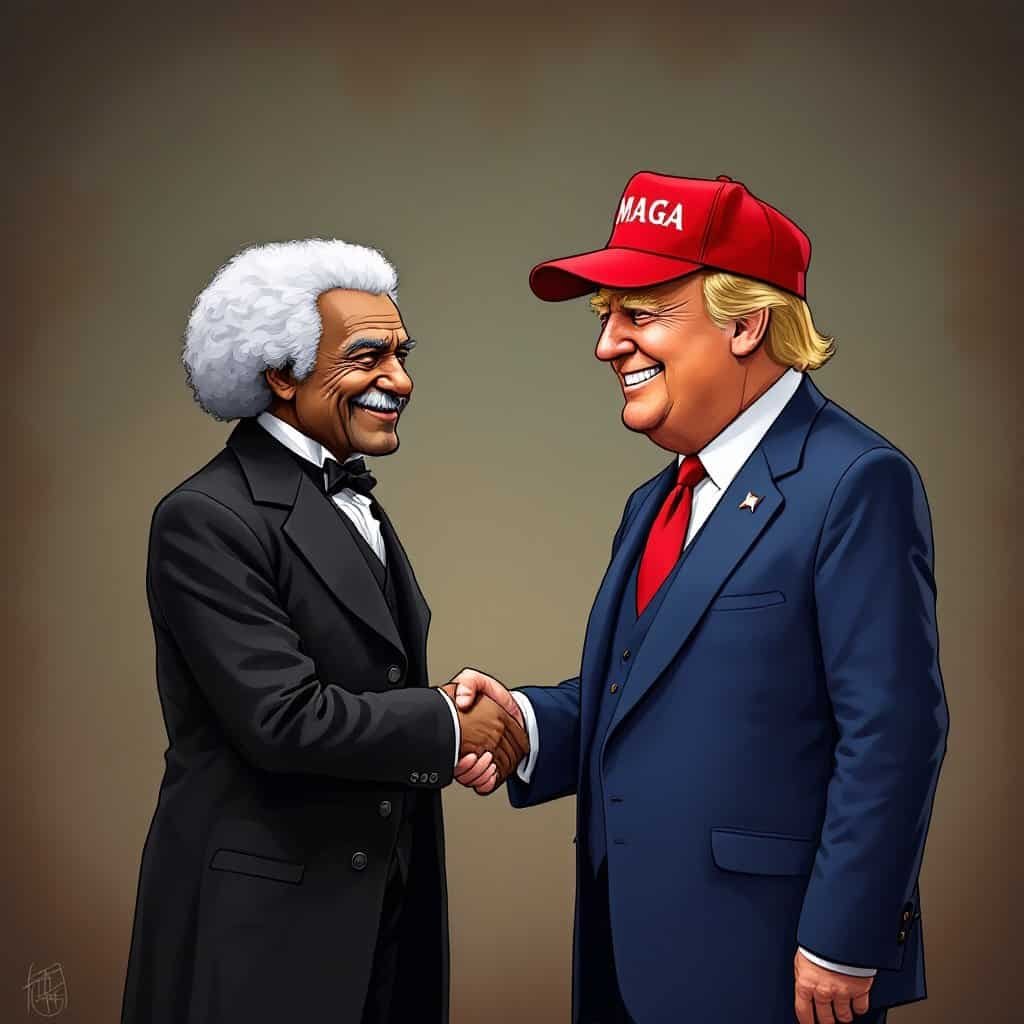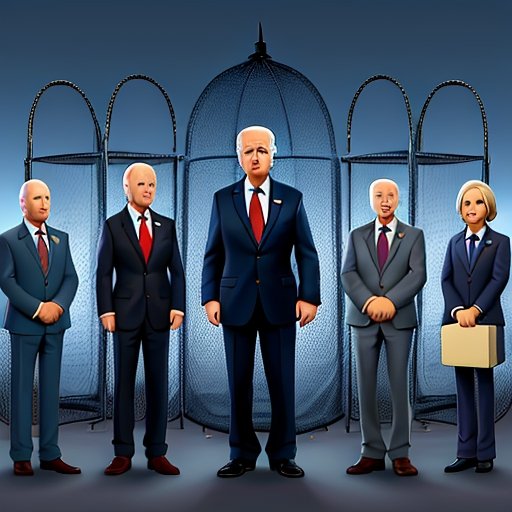Then as Today We Want the Best for All. Conservatism in America didn’t just sprout up overnight—it has deep roots in the fundamental principles of freedom and equality. Let us step back for a moment to revisit the origins of the American Republican Party. It’s essential to note that the GOP was forged as the party of emancipation, a clarion call against the evils of slavery. From the beginning, this party stood tall for liberty and justice, and one iconic figure who symbolizes its moral compass is Frederick Douglass.
Douglass, an indomitable spirit, aligned himself with Republican values because they matched his pursuit of equality and his quest to see America live up to its promises of freedom. Frederick Douglass collaborated with Republicans like Abraham Lincoln and Ulysses S. Grant to dismantle the shackles of slavery and tirelessly urged the country to protect the fledgling rights of the freedmen. His advocacy wasn’t rooted in politically expedient buzzwords; it was tied to what was morally right and fundamentally American. Although he occasionally urged the party to push harder on civil rights, his loyalty to the Republican ideals remained unshaken. His belief in individual liberty and equal opportunity remains part and parcel of what conservatism stands for today.
The MAGA Era and Modern Conservatism
Fast-forward to today’s modern conservative movement—the MAGA (Make America Great Again) era has tapped into similar themes of liberty, sovereignty, and individualism. Yet, unlike the straightforward moral narrative that emerged during the Civil War and Reconstruction, the current GOP finds itself painted with brushes some might call historically inaccurate. Critics often dismiss today’s conservative movement as intolerant, leveraging selective histories to paint a picture that does not reflect the core of what conservatism is about.
Timeline: Evolution of Republican Party
- 1854: Republican Party founded
- 1860-1865: Civil War era, Abraham Lincoln presidency
- 1865-1877: Reconstruction period
- 1960s: Civil Rights Movement
- 1980s: Reagan era conservatism
- 2016-present: MAGA movement
Political Transitions and Misconceptions
So, how has the Republican Party transitioned from the party of Frederick Douglass to one accused of racial insensitivity? The answer lies in a tangled web of political realignments, media narratives, and philosophical principles. Take, for example, the Southern Strategy. This strategic shift didn’t signify a departure from Republican interests in individual rights or small government—it was an attempt to appeal to a new voter base in a region that had long aligned with Democrats. Remember, it was the Democrat stronghold that originally resisted civil rights. Yet the narrative flipped over time, largely through a series of political headlines and misunderstanding of the strategy’s intention.
Another pivotal point in this misconception is the Civil Rights Act of 1964. Republicans provided substantial support for the act, but credit was handed to Democrat leaders due to a visible presidency under Lyndon B. Johnson. What Republicans had championed with integrity earlier was soon skewed under a different light. While Democrats shifted their political alignment, grabbing the spotlight as changemakers, the GOP stuck with its bedrock principles: fair opportunity for all Americans, implemented through colorblind policy frameworks.
Modern Republican Beliefs and Policies
This refusal to cave to identity politics has, over time, been mistaken as an unwillingness to address racism. Conservatives argue the exact opposite. By prioritizing personal liberty and individual responsibility, modern Republicans believe they create a bridge toward equality that avoids societal dependence or divisive identity markers. The movement is more about ensuring all Americans can thrive without tethering their destinies exclusively to government intervention.
A glance at the MAGA movement further illustrates how this belief system manifests today. Proponents are energized by revitalizing American exceptionalism, protecting constitutional freedoms, and growing opportunities for all citizens to achieve the American Dream. Critics of MAGA like pointing to ‘dog-whistle’ politics or referencing policies they perceive as racially problematic, but let’s be frank. Supporting voter ID laws or welfare reform isn’t about discrimination—it’s about ensuring integrity and fairness in process-driven systems.
Key Conservative Policies
- Lower taxes to stimulate economic growth
- Deregulation to foster business development
- Strong national defense
- Protection of individual liberties
- Support for free-market capitalism
- Emphasis on personal responsibility
Conservative Economic Perspectives
Of course, no movement is immune to criticism, and conservatism often struggles with the optics game. However, policy-wise, the actions of the modern GOP—lowering taxes, job creation through deregulation, and focusing on economic growth—have widely opened doors for Americans of all backgrounds. Critics may try to oversimplify decades of realignment or label policies as systemically biased, but these attempts do not align with the track record the party built as an engine for liberty.
Here’s an interesting perspective to consider. Conservative economics often get a bad reputation among progressives, who point to wealth disparities. But what remains overlooked is the fact that lower tax burdens and deregulation foster entrepreneurship, innovation, and growth. When businesses thrive, job opportunities pop up like wildfire. Everyone, regardless of race or ethnicity, reaps the advantages of a flourishing economy. This concept of building prosperity through economic freedom outshines policies focused on wealth redistribution, which often stifle business motivation and, consequently, hurt those they aim to help.
Contrasting Conservative and Progressive Ideologies
Now, contrasting these timeless values with progressive systems underscores why conservatism remains the torchbearer for liberty. Modern progressives often advocate policies reliant on expanding federal authority, funding social programs through heavier taxation, and fostering dependency on government handouts. This ideology, wrapped as benevolence, can lead to stunted individual empowerment—a critical area where conservatism decisively takes the higher ground.
Conservative Approach
- Limited government intervention
- Focus on individual responsibility
- Free-market solutions
- Lower taxes
Progressive Approach
- Increased government programs
- Focus on social welfare
- Government regulation
- Higher taxes for social programs
The Enduring Legacy of Conservative Values
What we see today is an enduring legacy of what Frederick Douglass championed centuries ago. A belief in empowerment does not vanish—it evolves. Whether under Abraham Lincoln’s leadership or Donald Trump’s, Republican ideals challenge overreach, promote free markets, and value the merit within every citizen. The GOP’s evolution is not about losing its moral fiber but reinforcing it in modern contexts. It is about standing for principle over political expedience while being unjustifiably attacked through manipulative narratives.
In closing, the movement that Douglass steadfastly supported forms the foundation of today’s conservative resurgence. By continuing to root their values in individual freedom and opportunity, staunch conservatives remain close to their origin story while paving the way for a united future for every American, no matter who you are or where you’re from. This all-American appeal still underscores that there is no better defender of liberty and justice than a conservative.
Table of Contents
- The MAGA Era and Modern Conservatism
- Political Transitions and Misconceptions
- Modern Republican Beliefs and Policies
- Conservative Economic Perspectives
- Contrasting Conservative and Progressive Ideologies
- The Enduring Legacy of Conservative Values






